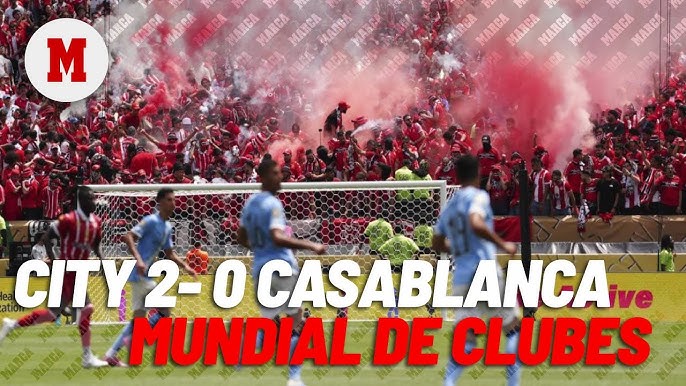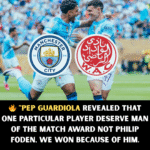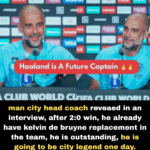Man City 2-0 Wydad Casablanca commentary

Manchester City began their FIFA Club World Cup campaign with a controlled 2-0 victory over Moroccan champions Wydad Casablanca at Lincoln Financial Field in Philadelphia. Goals from Phil Foden and Jeremy Doku secured the three points for Pep Guardiola’s side, though the performance was far from spectacular as City prioritized game management over entertainment in sweltering American conditions
The match got off to a blistering start for the Premier League champions, with Phil Foden needing just 114 seconds to break the deadlock. The England international, operating in his preferred central attacking midfield role, capitalized on some slack Wydad defending to fire City into an early lead that would prove crucial in setting the tempo for the remainder of the contest.
Foden’s early strike was a testament to City’s preparation and mental sharpness. Having traveled across the Atlantic and adjusted to different conditions, many teams might have taken time to settle into their rhythm. Instead, Guardiola’s men immediately imposed themselves on the game, with their high pressing and quick passing combinations causing immediate problems for the North African side.
The goal itself came from a typically incisive City move. Patient build-up play from the back found space in the Wydad defensive structure, and when the ball fell to Foden in a pocket of space just outside the penalty area, the 25-year-old showed the clinical finishing that has become his trademark. His low drive found the bottom corner, giving goalkeeper Younes Benabid no chance and sending the City supporters in attendance into early celebration.
If Foden’s opener demonstrated City’s tactical discipline, Jeremy Doku’s goal just before halftime showcased their individual quality and versatility in attack. The Belgian winger, who has emerged as one of City’s most exciting attacking threats since his arrival, produced a moment of genuine class to effectively kill the contest before the interval.
Doku’s volleyed finish was the highlight of the evening’s action. Receiving the ball on the left flank, the former Rennes man cut inside with typical directness, beating two Wydad defenders with close control and acceleration. As the ball sat up perfectly, Doku demonstrated excellent technique to guide his volley beyond Benabid and into the far corner of the net.
The goal was particularly significant as it came at a crucial psychological moment. Wydad had begun to grow into the game after weathering the early storm, creating a few half-chances of their own through quick counter-attacking moves. Doku’s strike, however, restored City’s comfortable cushion and allowed them to approach the second half with confidence and tactical flexibility.
From a tactical perspective, this match provided fascinating insights into Pep Guardiola’s approach to tournament football. Rather than seeking to overwhelm their opponents with relentless attacking play, City instead chose to control the game through possession and positional discipline.
The Spanish manager deployed what appeared to be a 4-3-3 formation, with Foden operating as a false nine or advanced playmaker, supported by Doku on the left and Savinho on the right. This front three provided constant movement and interchanging positions, making it difficult for Wydad’s defensive structure to maintain organization.
In midfield, the absence of regular starters like Rodri was notable, but City’s depth was evident as the replacements slotted seamlessly into Guardiola’s system. The midfield trio focused primarily on recycling possession and maintaining territorial dominance, rarely committing too many players forward in attack.
Defensively, City’s high line and aggressive pressing in the first half gave way to a more conservative approach as the game progressed. This pragmatic shift reflected both the scoreline and the conditions, with temperatures in Philadelphia reaching uncomfortable levels for European players unaccustomed to such heat.
Despite finding themselves two goals down, Wydad Casablanca showed admirable spirit and organization that spoke well of their credentials as African champions. The Moroccan side, managed with clear tactical awareness, refused to capitulate and continued to pose occasional threats through quick transitional play.
Their best moments came through rapid counter-attacks that exploited City’s high defensive line. On several occasions, Wydad’s pacey forwards managed to get in behind City’s defense, creating half-chances that required last-ditch defending from Nathan Ake and his defensive colleagues. These counter-attacks highlighted one of the few areas where City looked vulnerable throughout the contest.
Goalkeeper Younes Benabid was particularly impressive for the Moroccan side, making several crucial saves to prevent the scoreline from becoming more emphatic. His reflexes and positioning were tested repeatedly, particularly by Doku who seemed to relish the one-on-one battles with the keeper.
The North African champions also demonstrated good organizational discipline, maintaining their defensive shape even when chasing the game. Their compact 4-5-1 formation made it difficult for City to carve out clear-cut opportunities after the initial breakthrough, forcing the Premier League side to rely on individual moments of quality rather than systematic tactical dominance.
The second half saw Guardiola make strategic use of his squad depth, introducing key players at calculated moments. The most significant of these changes came in the 59th minute when Rodri, Erling Haaland, and Oscar Bobb were all introduced simultaneously.
Rodri’s return to action was particularly noteworthy, given his importance to City’s tactical system and his recent injury concerns. The Spanish midfielder’s presence immediately gave City greater control in the middle of the park, though he showed some rust in his passing – a understandable consequence of limited match time.
Haaland’s introduction brought a different dynamic to City’s attack. The Norwegian striker’s physical presence and clinical finishing ability provided a more direct attacking threat, though he was denied by some excellent goalkeeping from Benabid when presented with clear-cut chances.
These substitutions served multiple purposes: they allowed Guardiola to rest key players who had performed well in the first half, while also giving important squad members valuable minutes in competitive action. This rotation policy will be crucial as City navigate what promises to be a demanding tournament schedule.
The match’s most controversial moment came in the 88th minute when Rico Lewis received a straight red card for a challenge that divided opinion. The young defender, who had been impressive throughout the contest, slid in to win the ball but caught his opponent in the face with his follow-through.
While Lewis clearly won the ball first, the referee deemed his challenge dangerous play due to the high boot that struck the Wydad player. VAR reviewed the incident and upheld the on-field decision, leaving Lewis visibly frustrated as he trudged off the pitch.
The red card was harsh but perhaps understandable given modern football’s emphasis on player safety. Lewis’s challenge, while well-intentioned and successful in winning the ball, carried an element of danger that referees are increasingly reluctant to overlook. The decision highlighted the fine margins that can define crucial moments in tournament football.
This opening victory, while comfortable, revealed several tactical insights that may prove significant as the tournament progresses. City’s ability to control games through possession will serve them well against technically inferior opponents, but questions remain about their vulnerability to quick transitions.
Guardiola’s team was caught out several times by Wydad’s direct attacking play, suggesting that more sophisticated opponents might be able to exploit similar weaknesses. The manager will undoubtedly use this match as a learning experience, identifying areas for improvement before more challenging fixtures.
The performance also demonstrated the value of City’s squad depth. With several key players either rested or introduced as substitutes, the team maintained its tactical coherence and competitive intensity. This depth will be crucial as the tournament progresses and fixture congestion becomes a factor.
This professional, if unspectacular, victory provides City with the perfect platform to build upon as they progress through the Club World Cup. The two-goal margin gives them confidence, while the controlled nature of the performance suggests they have plenty more to offer when the stakes rise.
For Wydad Casablanca, this defeat should not overshadow what was a creditable performance against one of world football’s premier sides. Their organizational discipline and counter-attacking threat showed why they are considered among Africa’s strongest clubs.
The match served as an ideal tournament opener for City – challenging enough to maintain competitive sharpness, but comfortable enough to manage fitness and avoid unnecessary injury risks. As Guardiola’s side prepares for their next fixture, they will be confident that their systematic approach and individual quality will serve them well in pursuit of Club World Cup glory.
The victory moves Manchester City one step closer to adding another prestigious trophy to their collection, while providing valuable competitive minutes for players returning from injury and those fighting for regular starting positions. In tournament football, such professional victories often prove more valuable than spectacular displays, and City’s measured approach suggests they are taking this competition with the seriousness it deserves.
Manchester City’s 2-0 victory over Wydad Casablanca was the epitome of professional tournament football – efficient, controlled, and ultimately successful. While it may not live long in the memory for its entertainment value, it achieved its primary objectives: securing three points, maintaining fitness levels, and building momentum for the challenges ahead.
The performance demonstrated both City’s quality and their tactical maturity under Pep Guardiola. In conditions that might have unsettled less experienced sides, they delivered exactly the kind of performance that wins tournaments – professional, disciplined, and effective when it mattered most.
As the Club World Cup continues, this opening victory will be remembered not for its style, but for its significance in launching what City hope will be another successful trophy campaign.















